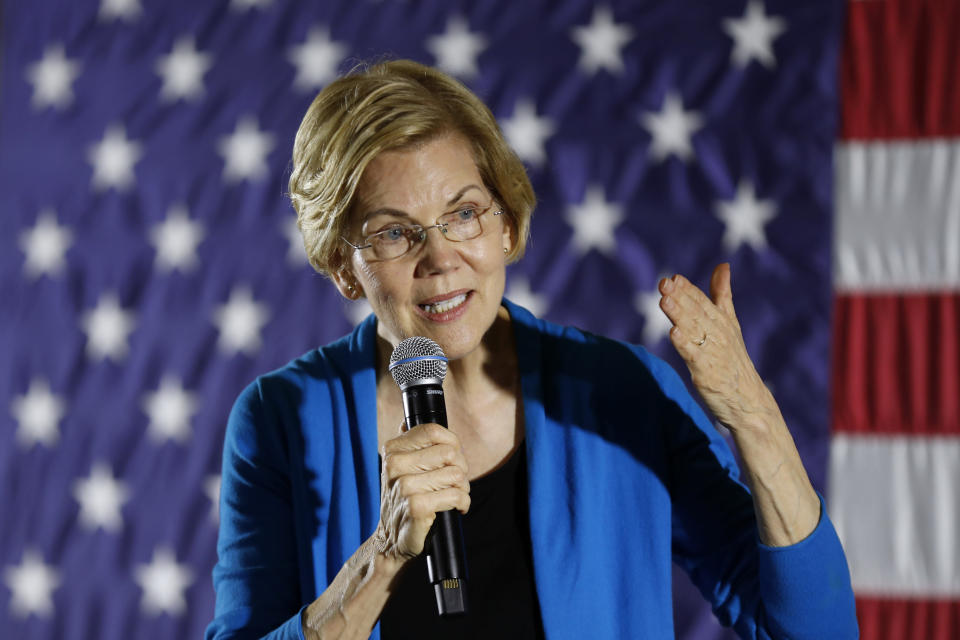Elizabeth Warren rolls out sweeping plan to confront opioid crisis
WASHINGTON—Sen. Elizabeth Warren, D-Mass., teamed up with Rep. Elijah Cummings (D-Md.) on Wednesday to announce the CARE Act, a $100 billion plan to fight the opioid crisis. Warren, who is running for president, framed the proposal as part of her larger push for a more fair economy in a blog post announcing the move.
“The ongoing opioid crisis is about health care. But it’s about more than that. It’s about money and power in America — who has it, and who doesn’t. And it’s about who faces accountability in America — and who doesn’t,” Warren wrote. “If the CARE Act becomes law, every single person would get the care they need. … We should pass it — not in two years, not after the 2020 elections — but immediately.”
Warren described opiates as a “national public health crisis of great magnitude” like the HIV/AIDS epidemic that emerged in the late 1980s. The CARE Act was modeled after legislation Congress passed in 1990 to fight AIDS.

“Resources would be used to support the whole continuum of care, from early intervention for those at risk for addiction, to harm reduction for those struggling with addiction, to long-term support services for those in recovery,” Warren wrote.
The CARE Act would provide $100 billion in federal funding over the next decade, with $2.7 billion annually for what Warren described as the “hardest hit” counties and cities, including those with the highest rates of overdoses. It would also give $500 million each year to expand access to naloxone, a life-saving drug that is used to treat opiate overdoses. Warren and Cummings produced a detailed breakdown of how much money would go to each state.
Warren has distinguished herself in the crowded field of Democratic presidential candidates by releasing over 20 detailed policy proposals. Most of her plans are focused on addressing structural inequities. In her blog post she suggested the CARE Act could be funded by another one of her policies, the Ultra-Millionaire Tax, which would apply to the top .1 percent of Americans.

“Here’s how it works. If you have more than $50 million, we’re going to ask you to pay a tax of two cents per dollar on every dollar after your fifty-millionth and first,” Warren wrote. “It raises $2.75 trillion over the next ten years — enough to pay for my plans to cancel student loan debt and provide universal free college, fully fund universal childcare, and end the opioid epidemic. And guess what — we’d still have nearly a trillion dollars left over.”
Warren also took aim at the Sackler family, a pharmaceutical dynasty who owned Purdue Pharma, the company behind the rise of Oxycontin. The Sacklers and Purdue have been implicated in schemes to minimize the addictive nature of the drug even as they promoted it.
“This crisis has been driven by greed, pure and simple. If you don’t believe that, just look at the Sackler family,” Warren wrote, adding, “They’re billionaires. They own mansions around the world. Entire wings of museums in New York and London have been stamped with the family name. But here’s the thing: The Sacklers made their money pushing OxyContin.”

According to her campaign, Warren is set to discuss her opioid policy on Friday in West Virginia, one of the states that has been hit hardest by the crisis. Warren also plans to discuss the proposal at events in Ohio on Friday and Saturday.
“The opioid epidemic teaches us that too often in America today, if you have money and power, you can take advantage of everyone else without consequence. I think it’s time to change that,” Warren wrote. “Under my opioid plan, billionaires like the Sacklers wouldn’t get to live the high life while only 1 out of 5 folks who need opioid treatment get the help they need. Instead, they would pay up.”
_____
Read more from Yahoo News:


